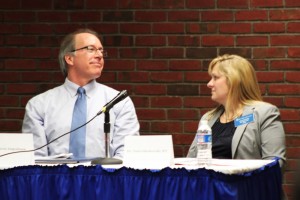By Mylin Batipps
Correspondent
The rate of childhood obesity in the nation is higher than ever before, and on Thursday, Feb. 23, the School of Nursing, Health and Exercise Science hosted a panel discussion in the Brower Student Center to address this issue and spread awareness among students, faculty and members of the community.
“Overcoming Childhood Obesity: Hope for the Future” was planned by the Student Nurses’ Association and the Health and Exercise Science Club in an effort to raise awareness of childhood obesity and evidence-based solutions for the epidemic.
Eight panelists were involved in the discussion, and Trina Gipson-Jones, assistant professor of the Department of Nursing, was the moderator.
Darrin W. Anderson, Sr., deputy director of the New Jersey Partnership for Health Kids, started the event by explaining how he and his company have been working with five communities in the state to reverse the childhood obesity epidemic by 2015.
“We have to get people out moving and engage people in physical activity that they enjoy doing,” Anderson said.
Gipson-Jones said approximately 12.5 million children ages two to nine in the U.S. are obese.
Avery Faigenbaum, professor of exercise science, said his research is with children and the outside factors causing them to become obese. Trash in the streets and dilapidated buildings, he said, are what lose children’s interests in playing outside.

“Play is the work of childhood, but we have engineered play out of children’s lives,” Faigenbaum said.
Phsyical education is not emphasized enough in schools across the nation, according to Faigenbaum.
“We need to put physical activity on the radar for all boys and girls,” he said.
Among these factors that cause childhood obesity are parents.
“Do children have the volition to purchase their own foods?” Gipson-Jones asked. “No, because their parents purchase their foods.”
Tami Jakubowski, pediatric nurse practitioner and assistant professor in the department of nursing, said that she works with parents of obese children to let them know ways to decrease their child’s body mass index, such as having them play outside for an hour when they are done with school and lowering their portion sizes on their dinner plates.
Panelists Sharese Porter and Robin E. Waddell, staff of the Cooperative Extension program at Rutgers University, focus on communities and how they come in different shapes and forms. For example, they explained that 50 percent of kids in Camden are obese because they are not allowed to play outside, nor do they have the interest, similar to Faigenbaum’s research findings.
Porter said that unfortunately, not many children can close their eyes and think of a memory of themselves playing outdoors because they have never been exposed to the opportunity.
“As adults, we have to find the kid in ourselves and experience those moments again so that we don’t rob our children of the same opportunities that we had,” Porter said.
After a brief Q&A session, Olivia Baxter, vice president of the Rancocas Valley Chapter of the Links, Inc., a non-profit organization focused on friendship and community service and Geraldine Eure, president of the Trenton Chapter — a graduate chapter — of Alpha Kappa Alpha Sorority, closed the event by thanking the panelists for the information that they presented and encouraging the audience to become active in the various programs that were presented.
“Be challenged,” Eure said. “You are the future.”






